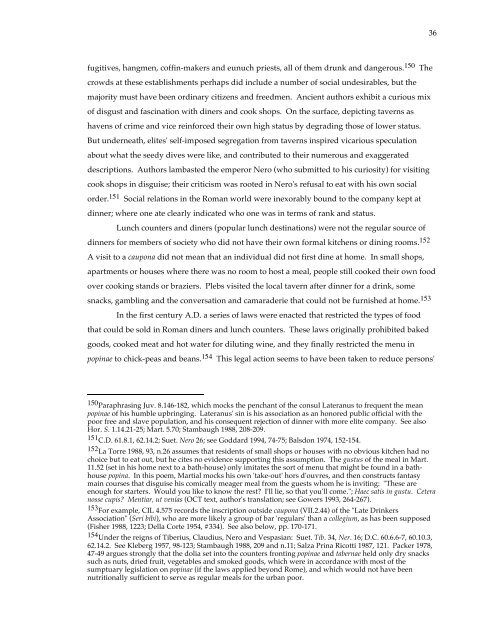KITCHENS AND DINING ROOMS AT POMPEII ... - Get a Free Blog
KITCHENS AND DINING ROOMS AT POMPEII ... - Get a Free Blog
KITCHENS AND DINING ROOMS AT POMPEII ... - Get a Free Blog
You also want an ePaper? Increase the reach of your titles
YUMPU automatically turns print PDFs into web optimized ePapers that Google loves.
fugitives, hangmen, coffin-makers and eunuch priests, all of them drunk and dangerous. 150 The<br />
crowds at these establishments perhaps did include a number of social undesirables, but the<br />
majority must have been ordinary citizens and freedmen. Ancient authors exhibit a curious mix<br />
of disgust and fascination with diners and cook shops. On the surface, depicting taverns as<br />
havens of crime and vice reinforced their own high status by degrading those of lower status.<br />
But underneath, elites' self-imposed segregation from taverns inspired vicarious speculation<br />
about what the seedy dives were like, and contributed to their numerous and exaggerated<br />
descriptions. Authors lambasted the emperor Nero (who submitted to his curiosity) for visiting<br />
cook shops in disguise; their criticism was rooted in Nero's refusal to eat with his own social<br />
order. 151 Social relations in the Roman world were inexorably bound to the company kept at<br />
dinner; where one ate clearly indicated who one was in terms of rank and status.<br />
Lunch counters and diners (popular lunch destinations) were not the regular source of<br />
dinners for members of society who did not have their own formal kitchens or dining rooms. 152<br />
A visit to a caupona did not mean that an individual did not first dine at home. In small shops,<br />
apartments or houses where there was no room to host a meal, people still cooked their own food<br />
over cooking stands or braziers. Plebs visited the local tavern after dinner for a drink, some<br />
snacks, gambling and the conversation and camaraderie that could not be furnished at home. 153<br />
In the first century A.D. a series of laws were enacted that restricted the types of food<br />
that could be sold in Roman diners and lunch counters. These laws originally prohibited baked<br />
goods, cooked meat and hot water for diluting wine, and they finally restricted the menu in<br />
popinae to chick-peas and beans. 154 This legal action seems to have been taken to reduce persons'<br />
150 Paraphrasing Juv. 8.146-182, which mocks the penchant of the consul Lateranus to frequent the mean<br />
popinae of his humble upbringing. Lateranus' sin is his association as an honored public official with the<br />
poor free and slave population, and his consequent rejection of dinner with more elite company. See also<br />
Hor. S. 1.14.21-25; Mart. 5.70; Stambaugh 1988, 208-209.<br />
151 C.D. 61.8.1, 62.14.2; Suet. Nero 26; see Goddard 1994, 74-75; Balsdon 1974, 152-154.<br />
152 La Torre 1988, 93, n.26 assumes that residents of small shops or houses with no obvious kitchen had no<br />
choice but to eat out, but he cites no evidence supporting this assumption. The gustus of the meal in Mart.<br />
11.52 (set in his home next to a bath-house) only imitates the sort of menu that might be found in a bathhouse<br />
popina. In this poem, Martial mocks his own 'take-out' hors d'ouvres, and then constructs fantasy<br />
main courses that disguise his comically meager meal from the guests whom he is inviting: "These are<br />
enough for starters. Would you like to know the rest? I'll lie, so that you'll come."; Haec satis in gustu. Cetera<br />
nosse cupis? Mentiar, ut venias (OCT text, author's translation; see Gowers 1993, 264-267).<br />
153 For example, CIL 4.575 records the inscription outside caupona (VII.2.44) of the "Late Drinkers<br />
Association" (Seri bibi), who are more likely a group of bar 'regulars' than a collegium, as has been supposed<br />
(Fisher 1988, 1223; Della Corte 1954, #334). See also below, pp. 170-171.<br />
154 Under the reigns of Tiberius, Claudius, Nero and Vespasian: Suet. Tib. 34, Ner. 16; D.C. 60.6.6-7, 60.10.3,<br />
62.14.2. See Kleberg 1957, 98-123; Stambaugh 1988, 209 and n.11; Salza Prina Ricotti 1987, 121. Packer 1978,<br />
47-49 argues strongly that the dolia set into the counters fronting popinae and tabernae held only dry snacks<br />
such as nuts, dried fruit, vegetables and smoked goods, which were in accordance with most of the<br />
sumptuary legislation on popinae (if the laws applied beyond Rome), and which would not have been<br />
nutritionally sufficient to serve as regular meals for the urban poor.<br />
36


